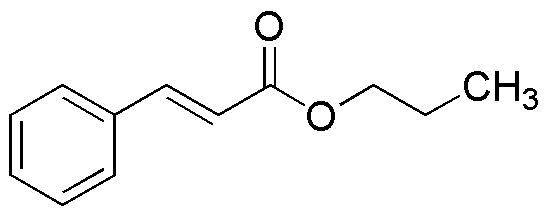3-Phenylpropyl cinnamate is widely utilized in research focused on:
- Fragrance and Flavor Industry: This compound is often used as a flavoring agent in food products and as a fragrance in cosmetics, providing a pleasant aroma and taste that enhances consumer appeal.
- Pharmaceuticals: It has potential applications in drug formulation due to its ability to improve the solubility and bioavailability of certain active ingredients, making medications more effective.
- Cosmetic Products: The compound is incorporated into skincare products for its antioxidant properties, helping to protect the skin from damage caused by free radicals and UV exposure.
- Research on Natural Products: It serves as a valuable reference compound in studies investigating the biological activities of natural products, aiding researchers in understanding plant-derived compounds.
- Polymer Chemistry: 3-Phenylpropyl cinnamate is used in the development of specialty polymers, contributing to materials with enhanced thermal stability and UV resistance, which are crucial in various industrial applications.
General Information
Properties
Safety and Regulations
Applications
3-Phenylpropyl cinnamate is widely utilized in research focused on:
- Fragrance and Flavor Industry: This compound is often used as a flavoring agent in food products and as a fragrance in cosmetics, providing a pleasant aroma and taste that enhances consumer appeal.
- Pharmaceuticals: It has potential applications in drug formulation due to its ability to improve the solubility and bioavailability of certain active ingredients, making medications more effective.
- Cosmetic Products: The compound is incorporated into skincare products for its antioxidant properties, helping to protect the skin from damage caused by free radicals and UV exposure.
- Research on Natural Products: It serves as a valuable reference compound in studies investigating the biological activities of natural products, aiding researchers in understanding plant-derived compounds.
- Polymer Chemistry: 3-Phenylpropyl cinnamate is used in the development of specialty polymers, contributing to materials with enhanced thermal stability and UV resistance, which are crucial in various industrial applications.
Documents
Safety Data Sheets (SDS)
The SDS provides comprehensive safety information on handling, storage, and disposal of the product.
Product Specification (PS)
The PS provides a comprehensive breakdown of the product’s properties, including chemical composition, physical state, purity, and storage requirements. It also details acceptable quality ranges and the product's intended applications.
Certificates of Analysis (COA)
Search for Certificates of Analysis (COA) by entering the products Lot Number. Lot and Batch Numbers can be found on a product’s label following the words ‘Lot’ or ‘Batch’.
*Catalog Number
*Lot Number
Certificates Of Origin (COO)
This COO confirms the country where the product was manufactured, and also details the materials and components used in it and whether it is derived from natural, synthetic, or other specific sources. This certificate may be required for customs, trade, and regulatory compliance.
*Catalog Number
*Lot Number
Safety Data Sheets (SDS)
The SDS provides comprehensive safety information on handling, storage, and disposal of the product.
DownloadProduct Specification (PS)
The PS provides a comprehensive breakdown of the product’s properties, including chemical composition, physical state, purity, and storage requirements. It also details acceptable quality ranges and the product's intended applications.
DownloadCertificates of Analysis (COA)
Search for Certificates of Analysis (COA) by entering the products Lot Number. Lot and Batch Numbers can be found on a product’s label following the words ‘Lot’ or ‘Batch’.
*Catalog Number
*Lot Number
Certificates Of Origin (COO)
This COO confirms the country where the product was manufactured, and also details the materials and components used in it and whether it is derived from natural, synthetic, or other specific sources. This certificate may be required for customs, trade, and regulatory compliance.

